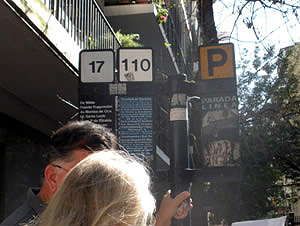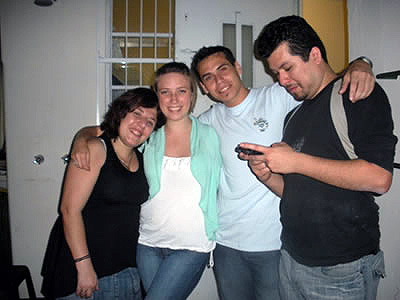How to Plan Your Study Abroad Experience
Living as a Student in Buenos Aires, Argentina
Article and photos by Megan Jones
“Este te causa engordar, no?” (This will make you fat, right?”)
“O! Como en las peliculas!” (Oh, like in the movies!)
“Cuando lo comes?” (When do you eat it?)
“Es muy dulce!” (It’s really sweet)
“Que es este?” (What is this?)
The object in question is peanut butter. The average American consumes 3 lbs of peanut butter yearly, so we often need to remember that peanut butter is not typically part of the international palette. The above are just a few examples of the odd questions and conversations filled with cultural discovery that I experienced while studying abroad in Buenos Aires, Argentina.
I participated in a study abroad program through the University of Georgia to perfect my Spanish language skills in a native environment while obtaining credit toward my Romance Languages major. As a student at UGA, many resources were already available to me; however, a few details would have sped up the search process had I been aware of them beforehand.
Given that the general question regarding studying abroad is not "Why?" but rather "When? And with what money?" I have tailored these guidelines to students looking to get the most experience from their money and time. Most of us have to propose studying abroad to our parents as an economical, educationally enriching experience. In my case, I even had to write a report for my parents, explaining why I should be allowed to study abroad! If you follow these steps, such a task will be less daunting.
I will go through seven general study abroad topics and then give advice on Argentina based on my personal experience.
The fundamental distinction to know when searching for programs is the difference between "study abroad" and "exchange." "Study Abroad" tends to be more group-oriented and provides more resources available upon arrival. "Exchange" indicates that a foreign and domestic university relationship must exist. Exchanges require a very independent person by nature since the level of immersion is typically higher, with less guidance after arrival.
General Guidelines for Planning Study Abroad
The most challenging factor in deciding to study abroad was finding a way to get the 12 credit hours necessary for me to graduate. Many programs tout "credit hours" available, but that does not necessarily mean those credit hours directly apply to your major or keep you on track toward graduation. Accumulating extraneous hours could also affect the Hope Scholarship (in Georgia) and other scholarships/grants and possibly postpone your graduation date.
The second concern is always time. Most summer programs are overpriced compared to complete semester programs. If you find a program that offers credits where you need them (as described above), the issue of taking off for a whole semester is less of a problem. Finally, if your main goal is to study a language, more than a summer is necessary to achieve fluency.
Studentuniverse.com is a great student-oriented website to start searching for cheap flights anywhere.
Also, Airtran offers a standby program for 18-22-year-olds where any 1-way flight within the continental U.S. costs $69. Consider the program if you need to get to a central hub like Atlanta or New York before departing on an international flight. Remember that these flights are on standby, so if you elect this option, leave ample time for an international connection. You can find more details at Southwest Airlines.
Another option is to ask everyone you know about leftover Skymiles. Many business people (aka, your friend's parents) end up with a ton of miles with no intention of using them anytime soon. The miles often expire quickly and require complicated maintenance fees, so people are usually more than happy to donate them to a worthy cause to get them out of their hair. You could even use Craigslist to advertise that you are in the market.
Most American universities offer study abroad services. However, they will refer you to other resources (websites, phone numbers, etc.). So, even if resources are available at your university, you must realize that you will still have to do more legwork independently.
The first step to finding housing should be to research the neighborhoods of the city you are visiting. Most of us wanted to end up between the "rich neighborhood" and the "poor neighborhood." As a rule, finding the middle ground ensures a fair price range and a safe environment.
Remember the power of social networking. You may use your Facebook page or blog to advertise that you are looking for housing abroad, and you will be shocked by the number of responses you receive.
-
How in the world do I pack for this?
-
Breathe deeply
-
Get started early
-
During a typical day, note what products you typically use, foods you cannot live without, and specific hygiene habits. Then actually write them down. It is a natural but problematic tendency to get caught up thinking about the exciting experience ahead of you and then to forget about your daily needs — needs that may be harder to meet in a new environment. Think of specific products that might be harder to come by at your destination. Make decisions between products you must bring from home and those you can wait and buy upon arrival. Do not be overly brave and think you can leave your American habits behind and immediately immerse yourself in a new culture. There will be some aspects of life at home that you will miss. Plan on it.
-
Remember any medical needs (contacts, birth control, etc.). Also, most doctors are willing to write pre-emptive prescriptions for antibiotics and Tamiflu. Although general medicines will most likely be available in your destination country, obtaining them will save you the trouble of finding a pharmacy when you are sick and cranky in a foreign country. (One particular word of advice to the ladies: tampons are often harder to come by in Latin America and can often be expensive for lower quality. Stock up.)
-
Some finishing touches
Be sure to register your destination(s) at U.S. Department of State site. As an American citizen, this ensures you will be cared for should any epidemic or government crisis occur during your time.
Also be sure to check into necessary immunizations early at the U.S. Department of State site. Often, you will require more than one shot/dose for one immunization, which requires weeks between shots. If "recommended" immunizations are unnecessary before you step foot in the country, consider the possibility of receiving the immunization at a cheaper rate in your destination country. I could have saved around $150 if I had considered the potential of the Yellow Fever shot recommended to go to Iguazu Falls at Argentina, Brazil, and Uruguay borders.
Choose a country where the exchange rate is in your favor. Such foresight is not just to save money but also to experience more during your stay. If you are preoccupied with spending too much money, having experiences you would not usually have in your home environment will be difficult.

|
|
The papers the author read through several times weekly for a P.R. agency.
|
Upon arrival at your destination country, I recommend searching for some internship or volunteer opportunity. I worked at a public relations agency (Colombo Pashkus) in Argentina. The social networking tool LinkedIn is an excellent way to contact specific people from businesses abroad. Remember, when in a foreign country, your most valuable asset is that you are now interested because you are foreign and you speak fluent English. Use these attributes to your advantage.
Toward the end of my trip, I returned over the summer to teach English. So, I prepared a rudimentary Spanish resume with the help of some friends and started sending out copies. It is best to find a way to return to a country while still in that country.
Tips for Living as a Student in Buenos Aires
Transportation

|
|
The bus stop.
|
Although the exchange rate is very much in your favor if you are American (US$1 is approximately 825 pesos, and constantly changing, due to massive inflation), and taxis are tempting at such a low rate, public transportation is still the best option if you are on a budget.
In general, the pace of public transport is swift. In Buenos Aires, natives are not typically patient with foreigners fumbling for change, taking too long to get on or off the bus, or in and out of line at the subway station.
The first thing you buy after landing should be a "Guia-T," a small booklet of complete maps of the capital city, including bus routes. You should be able to find them at any "kiosco," or small supermarket. Once you have figured out what bus number you need and where to wait, you need to have actual cash bills on you.
If you are planning on any travel outside of the city of Buenos Aires, keep in mind that Aerolineas Argentinas is known for its frequent strikes. So, if flying, I would recommend using LAN airlines instead.

|
|
Iguazu Falls.
|
The Dialect and Culture
If you are Argentina-bound and have taken traditional Spanish classes in the U.S., prepare to throw much of your knowledge out the window the first few days. Typical Spanish courses in the U.S. teach Castilian Spanish with little reference to the unique dialects of Latin America. During your first few days, you will need to do three translations mentally: "Argentinian" ->" Spanish" ->" English." The most audible difference is that Argentinians pronounce "ll" as "sh," rather than keeping it silent. Also, brush up on the "vosotros" verb form because its usage is extensive but usually skimmed over in typical Spanish classes in the U.S.
Some Examples of Useful Spanish:
-
Colectivo = autobus = bus
-
“Cai(sh)e” = calle = street
-
Portenios = Argentinos (de Buenos Aires) = Argentinians (from Buenos Aires)
-
Sos = eres = you are (this word is critical since it is likely one of the first questions asked will be, "Where are you from?" / "De Donde sos?")
Natives will be highly impressed if you know about the tradition of "mate," an herbal tea drunk from a gourd. You will see it everywhere. Check out this website fon mate for the basics.
Nearly all Argentinians use social media for chatting or communicating online, from Messenger to Facebook to WhatsApp. Ask them for their username, and they will undoubtedly give it up if asked. Chatting or making plans in Spanish online is significantly easier than talking on the phone. My Spanish improved substantially by doing so.
Safety in Buenos Aires
Of course, follow all typical travel guidelines: do not walk alone, do not wear a conspicuous brand of purse, do not look at a map in the middle of the sidewalk, do not hang your bag on the back of your chair, etc. But, the best safety precaution is to be with locals when you go out. Being a very blond, very white woman, I never once had a scary situation during my five months in Argentina following this policy. Latin American culture is more community-oriented than the U.S., so your new friends will look out for you dependably and agreeably.

|
|
Author with friends in Buenos Aires.
|
Another issue to consider is the location of ATMs. In the U.S., ATMs are located directly on the street. In Buenos Aires, they are usually inside a small glass building. I wandered around for at least 30 minutes the first time I looked for an ATM. This system is much more secure. You have to swipe your card's magnetic strip on a scanner on the door handle, then go in, and then the door shuts and locks behind you, and you can withdraw in relative safety. Nonetheless, be aware that an ATM is a prominent hotspot for pick-pocketing. So, as always, be cautious.
The International Student ID Card is often suggested to students studying abroad and is a good product, but it has little use in Latin America. However, an extra form of identification can never hurt if you have the extra cash. In addition, while in Buenos Aires, I was always sure to have the local university's (Universidad de Palermo) student identification. While a student I.D. card is less respected than the national I.D. card, it is generally received better than a copy of an American passport.
Since returning to the U.S., I have realized how valuable international experience is to a job search in any field. Foreign experience sets your resume apart. Conversely, I have also discovered how valuable it is to be a native English speaker abroad. Everyone wants to learn English. I intermixed Buenos Aires' culture with my own, which has only yielded positive benefits to my worldly understanding, job search, and social network.
While studying abroad can seem filled with logistics and an expensive way to study, it is truly the most rewarding experience one can take advantage of as a student.
The most important tips I can offer are:
1. Talk to everybody. People tend to be more interesting and interested in you than you think they are.
2. Plan ahead, but also accept that the beauty of studying abroad is the surprises.
Megan Jones is a double Advertising and Romance Languages major at the University of Georgia. She spent her childhood on a goat farm in Kentucky but finished school as a Georgia resident and went to college under the Hope Scholarship. She plans to return to Buenos Aires to teach English at the Berlitz Institute in the summer.
|
